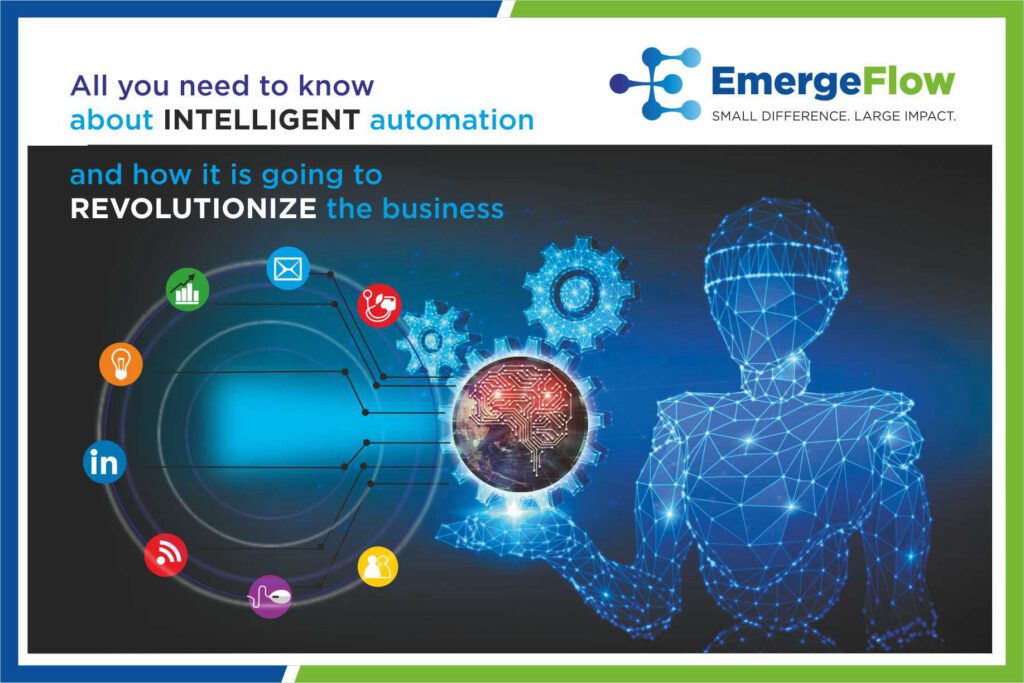Also, how is it different from Robotic Process Automation?

Intelligent automation (IA) is one of the biggest trends in the business world. It is a new term, coined in the industry which is revolutionizing the way in which businesses operate in almost every sector of the world economy. These technologies can capture, analyse and interpret huge amount of information to automate key workflows and processes.
These tools range from commonplace to ground-breaking, and many of them are always learning and evolving as they go. Unprecedented levels of quality and efficiency are being achieved by organisations thanks to intelligent automation, which is enabling them go beyond traditional performance.
What is intelligent automation?
Intelligent automation combines the Robotic Process Automation (RPA) and artificial intelligence (AI) technologies to empower rapid end-to-end process automation. It is a key tool to accelerate digital transformation.
As an example, Intelligent automation use machine learning to analyze historical and real-time workload and compute data. It then manage workloads to optimize runtime and prevent delays, and assist virtual machines to meet real-time demands.
IPA can be used across a whole range of industries and business processes. In the FinTech industry, IA can be used in loan applications, credit decisioning, and claims processing. In the healthcare domain, it can be useful to maintain security of patient records.
It is an amalgamation of people, organizations and key technologies, which is aimed at automating end-to-end processes on computers. It aims to deliver business outcomes on behalf of employees to deliver faster and better services at significantly lower costs. IA plays a huge role in enhancing customer experience apart from improving the employee experience.
How does intelligent automation help employees and customers?
Intelligent automation empowers employees to do work faster and helps them to allocate more time to more meaningful tasks. Employees have an option to do quality work with the power of IA.
Both the employee and consumer experiences are very important for businesses to succeed. Intelligent automation can eliminate waiting in line for a train ticket or to see a bank representative. Ninety percent of clients never even bother to complain, and ninety percent never come back. Understanding what makes a customer satisfied and how to win their loyalty is thus genuinely a mystery at this point, with intelligent automation playing a key role.
How is intelligent automation different from Robotic Process Automation?
The difference between Robotic Process Automation and Intelligent Process Automation is that IPA is a big umbrella and RPA comes under it. RPA is used to perform repetitive tasks with minimal variation whereas IPA (RPA + AI) is used to tackle more complex end-to-end processes.
RPA is rule and logic based and applies rules made by humans to perform a task, for example, sending an automatic reply to an email. IA, on the other hand makes use of AI technologies such as machine learning, which means it takes up tasks that require judgement analysis and critical thinking.
In terms of document understanding, RPA makes use of standard rules and patterns, while IA tries to understand the language using NLP and makes more informed decisions.
While there is a significant differences between the two of them, both technologies can work together and leverage each other’s strengths. IA can optimize processes while RPA is useful for more structured and repetitive tasks.
Why are business adopting Intelligent Automation?
Here are some potential reasons for businesses to adopt intelligent automation
- IA works securely with a much faster speed across the enterprise
- It digitizes operating models to readily match expectations of the businesses and users
- It is capable to support high-end tech-powered processes
- IA is very flexible and is easily adaptable in changing work structures
- It enables businesses to compete well in the market by providing superior customer experience
What does the future hold?
With the benefits of lower costs of operation, better quality, and better customer service, it’s no surprise that so many businesses are turning to intelligent automation. Companies are turning towards intelligent automation as it provides better quality, superior customer service and offers economies of scale through cost reduction techniques. Many organizations have decided to introduce it in their workflows to become better equipped with innovative and competitive competency.
In the upcoming years, we may anticipate seeing an increasing number of organisations adopt automation, especially as it has become more affordable for small-to-medium businesses. And to use the power of your own unique IPA systems, you don’t even require a technically skilled staff.
If you can relate to these facts, you can contact us to know more.
